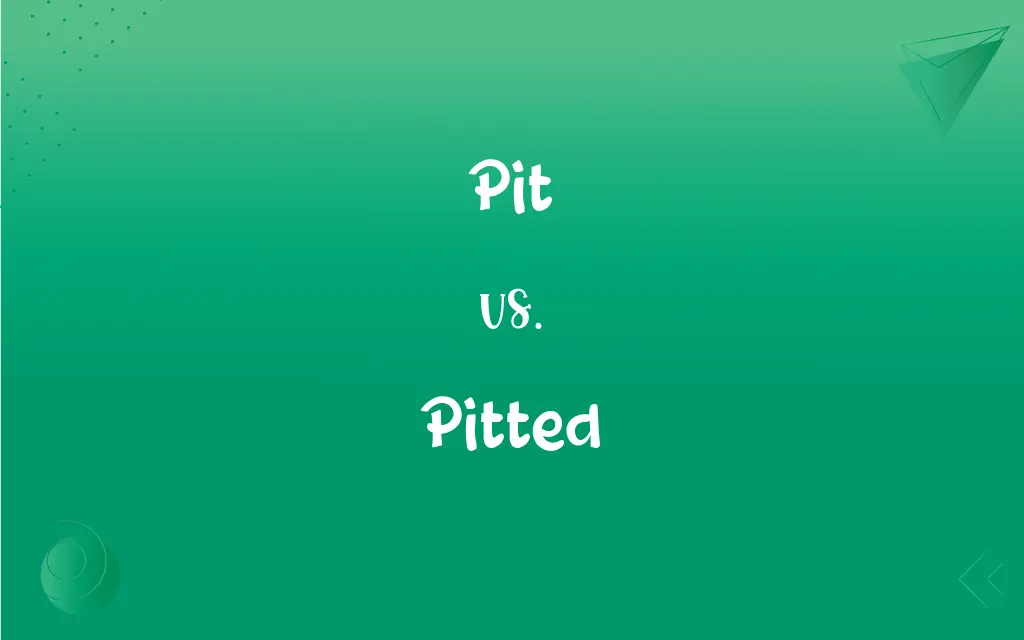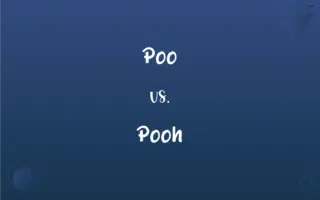Pit vs. Pitted: What's the Difference?
Edited by Aimie Carlson || By Janet White || Updated on February 5, 2024
"Pit" is a noun or verb meaning a hole or to set in opposition, while "pitted" is the past tense of "pit," indicating something has been removed or faced opposition.

Key Differences
"Pit" can function as both a noun and a verb, indicating a hole or cavity in the ground or a fruit, or the action of removing the seed from a fruit. "Pitted," on the other hand, is the past participle of "pit" when used as a verb, describing something from which the pit has been removed or that has been placed into a contest or conflict.
As a verb, "pit" implies the act of creating a pit or engaging in conflict, such as in sports or debates. Conversely, "pitted" suggests that the action has already occurred, indicating a completed state where an object has had its pit removed or has been involved in a conflict.
In the context of competition, "to pit" means to set against or compete, highlighting an ongoing or future event. "Pitted," in this context, refers to past events where competitors were already matched against each other, highlighting a completed action.
When discussing the physical removal of pits from fruits, "pit" serves as a directive or process, while "pitted" describes fruits that have already undergone this process, emphasizing the outcome rather than the action.
In terms of usage, "pit" offers a broader range of applications, including as a metaphor for challenges or depths in abstract concepts. "Pitted" focuses more narrowly on outcomes or states resulting from being subjected to the action implied by "pit."
ADVERTISEMENT
Comparison Chart
Part of Speech
Can be a noun or verb
Past participle or adjective
Action vs. State
Implies action (to remove, to set against)
Indicates a completed action or state
Usage in Context
Refers to the act or the object itself (a hole)
Refers to something having undergone the act
Relation to Time
Present or future tense (action happening)
Past tense (action has happened)
Connotation
Can imply potential or intention (preparation)
Implies completion or aftermath (result)
ADVERTISEMENT
Pit and Pitted Definitions
Pit
A hollow or depression in the ground.
The archaeologists excavated an ancient pit.
Pitted
Having had the pit or seed removed.
She preferred pitted olives in her salad.
Pit
The hard, central cavity in certain fruits containing the seed.
He carefully removed the pit from the cherry.
Pitted
Engaged in competition or conflict.
The knights were pitted against each other in the tournament.
Pit
An area in a theater or opera house, typically below the stage level.
The musicians tuned their instruments in the pit before the performance.
Pitted
Showing signs of being worn or eroded.
The pitted facade of the building told a story of neglect.
Pit
A part of a racetrack where maintenance is performed.
The race car pulled into the pit for a tire change.
Pitted
Having a rough, textured surface.
The pitted surface of the metal showed years of wear.
Pit
To set in direct competition or opposition.
The debate will pit two leading experts against each other.
Pitted
Marked by pits.
Pit
A natural or artificial hole or cavity in the ground.
Pitted
Having the pit removed
Pitted dates.
Pit
An excavation for the removal of mineral deposits; a mine.
Pitted
Simple past tense and past participle of pit
Pitted
Having a surface marked by pits; pockmarked or alveolate
Pitted
(of fruit) Having had the pits removed
Pitted
Provided with one or more inspection pits.
Pitted
Having minute thin spots; as, pitted ducts in the vascular parts of vegetable tissue.
Pitted
Pitted with cell-like cavities (as a honeycomb)
Pitted
Marked by depressions or scars.
The old road was pitted with potholes.
FAQs
How does "pit" function in sports terminology?
It means to place one competitor against another.
Can "pit" be used as a verb?
Yes, it can mean to remove the seed from a fruit or to set against in competition.
What does "pit" mean when referring to fruit?
It refers to the hard core containing the seed.
What is meant by "pitted" cherries?
Cherries that have had their pits or seeds removed.
Is "pitted" only used in the context of fruits?
No, it can also describe surfaces, competitions, or states after an action.
Can "pit" refer to an area in a theater?
Yes, it's the area typically below the stage or orchestra pit.
How do you use "pit" in a sentence referring to competition?
The tournament will pit the best players against one another.
What does "pitted" signify in automotive contexts?
It can refer to cars that have entered the pit stop for maintenance.
What does "pitted" mean in a historical context?
It could refer to soldiers or factions that were set against each other.
Does "pitted" always imply physical alteration?
Not always; it can also imply a state resulting from competition or conflict.
Can "pit" indicate a problem or challenge?
Yes, metaphorically, it can represent a difficulty or low point.
What is the significance of "pit" in mining?
It refers to a large hole or excavation in the ground for mining.
How does "pitted" relate to textures?
It can describe surfaces that are marked with small depressions or holes.
What does "pit" mean in financial contexts?
Historically, it referred to areas of the trading floor where trading occurs.
Can "pitted" describe a person's experiences?
Yes, if they've been through challenges or conflicts.
How is "pitted" used in literature?
It can describe characters or settings that have faced or show signs of conflict or wear.
What's the difference between "pitted" and "unpitted" fruits?
Pitted fruits have had their seeds removed; unpitted fruits have not.
How is "pit" used in relation to a racetrack?
It refers to the area where vehicles receive maintenance during a race.
Is "pit" always negative in connotation?
Not necessarily; it depends on the context (e.g., pit orchestra).
Can "pitted" have a positive connotation?
In certain contexts, yes, such as when referring to prepared foods.
About Author
Written by
Janet WhiteJanet White has been an esteemed writer and blogger for Difference Wiki. Holding a Master's degree in Science and Medical Journalism from the prestigious Boston University, she has consistently demonstrated her expertise and passion for her field. When she's not immersed in her work, Janet relishes her time exercising, delving into a good book, and cherishing moments with friends and family.
Edited by
Aimie CarlsonAimie Carlson, holding a master's degree in English literature, is a fervent English language enthusiast. She lends her writing talents to Difference Wiki, a prominent website that specializes in comparisons, offering readers insightful analyses that both captivate and inform.































































